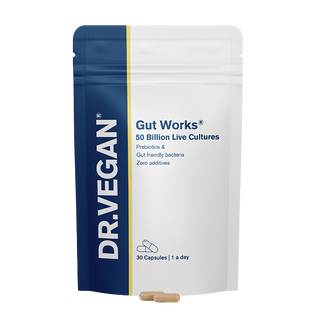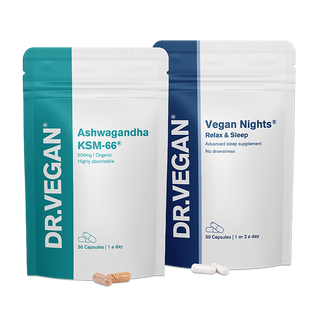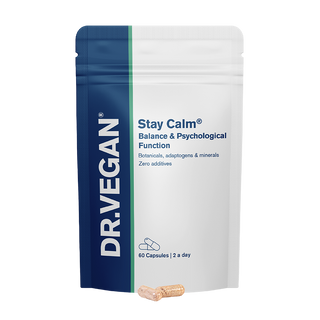How to beat chronic fatigue

Chronic fatigue or low energy are very common - we can feel it for a day or two, for a few months, and for some it can persist for years. Hormone changes, stress, a lack of sleep, certain health conditions, lack of exercise, and a poor diet lacking in essential nutrients are all potential causes. Our nutritionists explain the causes of 'long tiredness' and how changing your diet will help beat fatigue.
What causes extreme fatigue
Here are seven common causes of extreme fatigue.
1. Nutrient deficiencies
Nutrient deficiencies are a major cause of tiredness and fatigue. The most common nutrient deficiency relating to tiredness is low Iron, however deficiencies in Iodine and B vitamins, Vitamin C and Magnesium can all have a similar impact. You can learn more in 'How do I know if I'm deficient in Magnesium'.
What's your diet missing? Create your free Diet Profile.
All these nutrients are directly required by your body for the energy production cycle, known as the 'Krebs cycle'. A deficiency in Iron, B vitamins and Copper can also cause problems with blood cell formation and haemoglobin, the oxygen-carrying part of blood cells, which also leads to fatigue.
2. Poor gut health and digestion
Even if you are eating a good diet, if your gut health is compromised, you will not be absorbing the nutrients from the foods you eat to fuel your energy and brain.
Low digestive enzymes and poor gut bacteria are the main causes of poor digestion, and the probiotics in your gut are vital for the synthesis of serotonin, your 'happy hormone' that drives your motivation and mental performance. Discover the 6 signs of an unhealthy gut and learn more in 'What are probiotics?'.
Shop our acclaimed pre & probiotic, Gut Works®, with 50bn CFU
3. Viral infections
Viral infections are a common cause of chronic fatigue. This can be the result of excess stress of the adrenal glands, nutrient deficiencies left by a virus, and possible damage to the body's cells triggered by the inflammation from fighting a virus.
4. Poorly functioning adrenal glands
Your adrenal glands are two glands that sit on top of your kidneys and produce the hormones 'adrenaline' and 'cortisol'. Adrenaline and cortisol are the stress hormones that help you deal with stress and regulate energy levels.
When the adrenal glands become tired after a period of prolonged or extreme stress, their function is compromised which leads to unbalanced and low moods, low energy and fatigue.
Learn more in 'What is cortisol'.
5. Poor quality sleep
You may think you are getting enough sleep, but if your quality of sleep is poor, or you do not complete a full sleep cycle, you will feel tired and fatigued during the day. Long term sleep deprivation contributes towards a number of health conditions as well as chronic fatigue, so understanding and correcting sleep cycles is important.
High levels of cortisol is one of most common but little know causes of poor sleep. Cortisol inhibits the production of melatonin, your sleep hormone, so if you suffer anxiety in the evenings, an effective remedy is to take Ashwagandha KSM-66 before bedtime which helps to lower cortisol, enabling your body to produce melatonin, helping you get to sleep and stay asleep.
Your diet is also very important for your sleep - learn more in 'How your diet can help your sleep'.
Our De-stress & Sleep Bundle includes Ashwagandha KSM-66® alongside Vegan Nights® for better, deeper sleep.
6. Low thyroid function
Your thyroid gland is located in your neck and produces thyroid hormones from iodine. Thyroid hormones control your metabolism and the rate at which your body makes energy. An underactive thyroid is a very common cause of tiredness and fatigue.
You may enjoy our nutritionists' 'Tips for an underactive thyroid' and 'Best foods for thyroid health'.
7. Heavy metals
Having a store of heavy metals in your body can interfere with energy production. Heavy metals can accumulate due to many factors including smoking, using aluminium cookware, and mercury tooth fillings. Heavy metals are also included in some common pharmaceutical medications.
Why am I always tired?
Here are five ways to get to the bottom of chronic fatigue and relentless tiredness and what's causing it.
1. Get a blood test
Ask your GP for a blood test to look for deficiencies of Iron, B Vitamins and other nutrients. Any deficiencies found can be corrected by supplements or a change in your diet.
2. Analysis diet
Not all nutrient deficiencies can be detected by a blood test, so it is important to adapt your diet to address any obvious deficiencies, or remove foods that can contribute to fatigue.
What's your diet missing? Discover here in 3 minutes
A good place to start is creating your free Diet Profile. When you have analysed your diet, start by removing foods that inhibit energy and sleep, and replacing these one-by-one with foods that are beneficial for energy. The most common foods causing fatigue include refined bread, sugary foods and drink, high processed foods, alcohols, biscuits, and milk and dairy. Learn more in 'The latest gut health customer survey'.
Keep a log of what you remove from your diet and monitor your energy levels. Each change you make should last at least 5-10 days, so it may be 6-8 weeks before you identify what works well for you, and what doesn't.
You may need professional to help you with this if you are unsure. Taking a comprehensive Daily Multi-Vitamin formula can also safeguard your intake of essential nutrients and protect against deficiencies.
3. Get your thyroid checked
Ask your GP for a thyroid test. There are several elements that need to be looked at in a thyroid test. These are TSH, T4, T3 and reverse T3. Until you have the results to all of these, low thyroid hormones can’t be ruled out.
Learn more in 'Best foods for thyroid health'.
4. Assess your sleep quality
Keep a track of the number of times you wake during the night and the actual hours you are asleep for. A sleep tracking device or app on a smart phone can help you do this so you understand how many hours of deep and good quality sleep you are getting, as well as picking up on any sleep apnoea, where your breathing stops and starts while you sleep.
Discover 'How your diet can improve your sleep'.
5. Check for heavy metals
Having a small amount of heavy metals, such as Iron and Zinc, is essential for the health of our body. However, too large amounts can be toxic. A professional nutritionist or naturopath can help you access tests to look at your heavy metal status. If heavy metals in your body are too high, they can help you to detoxify.
Best foods to beat tiredness
There are a few foods for energy which can help in beating fatigue when consumed regularly.
Complex carbohydrates and protein
A combination of complex carbohydrates and protein consumed every 2 to 3 hours provides a steady supply of energy to help you get through the day mentally and physically. Discover the '5 best carbs for plant-based meals'.
Relieve anxiety, manage stress with Stay Calm™.
Sunflower & pumpkin seeds
Sunflower and pumpkin seeds contain the amino acid L-tryptophan. L-tryptophan converts in our gut into 5-HTP, and then into serotonin and melatonin. Serotonin is our 'happy hormone' and is needed for focus, concentration, a sharp mind and improving our brain's memory function. Melatonin is our sleep hormone and is required for the onset of sleep.
You can also consider taking Vegan Nights® half an hour before bed for better, deeper sleep.

Enjoy your free healthy granola bar recipe
Wholegrains
Wholegrains are rich in B Vitamins which are needed to support brain fog and tiredness. B Vitamins are needed for both energy production and brain function. Wholegrains also provide Magnesium which is needed for both energy and sleep quality.
If you're not gaining enough wholegrains in your diet, you can also take a Magnesium supplement to compliment your diet.
Seaweed
Seaweed is rich in iodine which is needed for the production of thyroid hormones and managing your rate of metabolism. Seaweed can be added to lots of recipes is a good food to eat in moderation when pregnant.
B Vitamin Complex supplement
A high quality B Vitamin Complex supplement can support energy production and also falls under the category of brain boosting supplements as they support brain cell function.
You may also enjoy 'Best supplements for brain health'.
Want to hear more from our nutritionists? Sign up to our email newsletter for insights and exclusive offers:





















